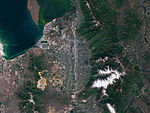West Lake Junior High
1964 establishments in UtahBuildings and structures in West Valley City, UtahPublic middle schools in UtahSchool buildings completed in 1964Schools in Salt Lake County, Utah ... and 1 more
Utah school stubs
West Lake STEM Junior High or WLJH is a public junior high in West Valley City, Utah. It is located at 3400 South and 3450 West in the Granger region of West Valley City. The school belongs to the very large Granite School District, which covers a large portion of the Salt Lake Valley in Utah.
Excerpt from the Wikipedia article West Lake Junior High (License: CC BY-SA 3.0, Authors).West Lake Junior High
Westgene Circle, West Valley City
Geographical coordinates (GPS) Address External links Nearby Places Show on map
Geographical coordinates (GPS)
| Latitude | Longitude |
|---|---|
| N 40.699166666667 ° | E -111.97444444444 ° |
Address
West Lake Junior High School
Westgene Circle
84119 West Valley City
Utah, United States
Open on Google Maps





